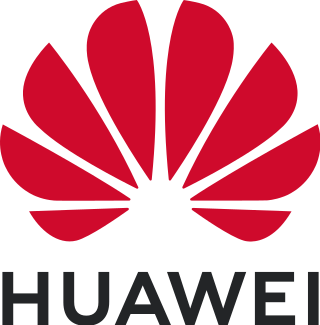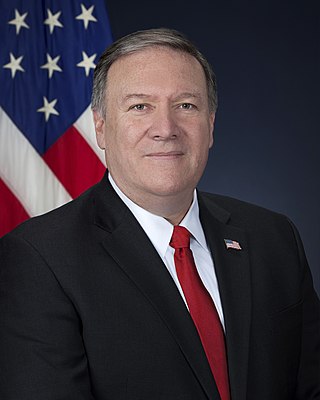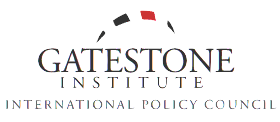
The relationship between the People's Republic of China (PRC) and the United States of America (USA) has been complex and at times tense since the establishment of the PRC and the retreat of the government of the Republic of China to Taiwan in 1949. Since the normalization of relations in the 1970s, the US–China relationship has been marked by numerous perennial disputes including the political status of Taiwan, territorial disputes in the South China Sea, and more recently the treatment of Uyghurs in Xinjiang. They have significant economic ties and are significantly intertwined, yet they also have a global hegemonic great power rivalry. As of 2023, China and the United States are the world's second-largest and largest economies by nominal GDP, as well as the largest and second-largest economies by GDP (PPP) respectively. Collectively, they account for 44.2% of the global nominal GDP, and 34.7% of global PPP-adjusted GDP.

Huawei Technologies Co., Ltd. is a Chinese multinational digital communications technology conglomerate corporation headquartered in Bantian, Longgang District, Shenzhen, Guangdong. It designs, develops, manufactures and sells telecommunications equipment, consumer electronics, smart devices and various rooftop solar products. The corporation was founded in 1987 by Ren Zhengfei, a former officer in the People's Liberation Army (PLA).

Taiwan pursued a number of weapons of mass destruction programs from 1949 to the late 1980s. The final secret nuclear weapons program was shut down in the late 1980s under US pressure after completing all stages of weapons development besides final assembly and testing. Taiwan lacked an effective delivery mechanism and would have needed to further miniaturize any weapon for effective use in combat. Currently, there is no evidence of Taiwan possessing any chemical, biological, or nuclear weapons. However, nuclear weapons from the United States were deployed to Taiwan during a period of heightened regional tensions with China beginning with the First Taiwan Strait Crisis and ending in the 1970s.

ZTE Corporation is a Chinese partially state-owned technology company that specializes in telecommunication. Founded in 1985, ZTE is listed on both the Hong Kong and Shenzhen Stock Exchanges.
The Government of China is engaged in espionage overseas, directed through diverse methods via the Ministry of State Security (MSS), the Ministry of Public Security (MPS), the United Front Work Department (UFWD), People's Liberation Army (PLA) via its Intelligence Bureau of the Joint Staff Department, and numerous front organizations and state-owned enterprises. It employs a variety of tactics including cyber espionage to gain access to sensitive information remotely, signals intelligence, human intelligence as well as influence operations through united front activity targeting overseas Chinese communities and associations. The Chinese government is also engaged in industrial espionage aimed at gathering information and technology to bolster its economy, as well as transnational repression of dissidents abroad such as supporters of the Tibetan independence movement and Uyghurs as well as the Taiwan independence movement, the Hong Kong independence movement, Falun Gong, pro-democracy activists, and other critics of the Chinese Communist Party (CCP). The United States alleges that the degree of intelligence activity is unprecedented in its assertiveness and engagement in multiple host countries, particularly the United States, with economic damages estimated to run into the hundreds of billions according to the Center for Strategic and International Studies.
Hon Hai Precision Industry Co. Ltd., trading as Hon Hai Technology Group in China and Taiwan, and as Foxconn internationally, is a Taiwanese multinational electronics contract manufacturer established in 1974 with headquarters in Tucheng District, New Taipei City, Taiwan. In 2021, the company's annual revenue reached 6.83 trillion New Taiwan dollars and was ranked 20th in the 2023 Fortune Global 500. It is the world's largest contract manufacturer of electronics. While headquartered in Taiwan, the company earns the majority of its revenue from assets in China and is one of the largest employers worldwide. Terry Gou is the company founder and former chairman.

Kim Jong Un is a North Korean politician who has been supreme leader of North Korea since 2011 and the leader of the Workers' Party of Korea (WPK) since 2012. He is the third son of Kim Jong Il, who was the second supreme leader of North Korea, and a grandson of Kim Il Sung, the founder and first supreme leader of the country.

After the United States established diplomatic relations with the People's Republic of China (PRC) in 1979 and recognized Beijing as the only legal government of China, Taiwan–United States relations became unofficial and informal following terms of the Taiwan Relations Act (TRA), which allows the United States to have relations with the Taiwanese people and their government, whose name is not specified. U.S.–Taiwan relations were further informally grounded in the Six Assurances in response to the third communiqué on the establishment of US–PRC relations. The Taiwan Travel Act, passed by the U.S. Congress on March 16, 2018, allows high-level U.S. officials to visit Taiwan and vice versa. Both sides have since signed a consular agreement formalizing their existent consular relations on September 13, 2019. The US government removed self-imposed restrictions on executive branch contacts with Taiwan on January 9, 2021.

Robert Charles O'Brien Jr. is an American attorney who served as the twenty-seventh United States national security advisor from 2019 to 2021. He was the fourth and final person to hold the position during the presidency of Donald Trump. He is currently the chairman of the American Global Strategies firm advising companies on international politics, the U.S. government, and crisis management.

Michael Richard Pompeo is an American politician who served in the administration of Donald Trump as director of the Central Intelligence Agency (CIA) from 2017 to 2018 and as the 70th United States secretary of state from 2018 to 2021. He also served in the United States House of Representatives from 2011 to 2017.

Arthur Waldron is an American historian. Since 1997, Waldron has been the Lauder Professor of International Relations in the department of history at the University of Pennsylvania. He works chiefly on Asia, China in particular, often with a focus on the origins and development of nationalism, and the study of war and violence in general.
Paul Thomas Haenle is an American analyst and China specialist currently serving as Maurice R. Greenberg Director’s Chair at the Carnegie Endowment for International Peace.

Gatestone Institute is an American conservative think tank based in New York City, known for publishing articles pertaining to U.S. foreign policy in the Middle East, specifically with regard to Islamic extremism. It was founded in 2012 by Nina Rosenwald, who serves as its president. John R. Bolton, former U.S. Ambassador to the United Nations and former National Security Advisor, was its chairman from 2013 until March 2018. Its current chairman is Amir Taheri. The organization has attracted attention for publishing false or inaccurate articles, some of which were shared widely.

The Coming Collapse of China is a book by Gordon G. Chang, published in 2001, in which he argued that the Chinese Communist Party (CCP) was the root cause of many of China's problems and would cause the country's collapse by 2011. When 2011 was almost over, Chang admitted that his prediction was wrong but said it was off by only a year, asserting in Foreign Policy that the CCP would fall in 2012. Consequently he made the magazine's "10 worst predictions of the year" twice.

Michael John Gallagher is an American politician who served as a member of the United States House of Representatives, representing Wisconsin's 8th congressional district for the Republican Party between 2017 and 2024.

Kelly Dawn Craft is an American businesswoman, politician, and former diplomat who served as the 30th United States Ambassador to the United Nations from 2019 to 2021 under President Donald Trump. She was confirmed as the US ambassador to the United Nations by the US Senate by a vote of 56–34, and was officially sworn in September 2019.

Matthew Forbes Pottinger is an American former journalist and U.S. Marine Corps officer who served as the United States deputy national security advisor from September 22, 2019 to January 7, 2021. Previously Asia director on the National Security Council since 2017, his tenure was unusual among senior aides serving under President Trump for its length, given an administration marked by high turnover. Pottinger worked to develop the Trump administration's policies towards China.

Michael George Glen Waltz is an American politician and a colonel in the United States Army serving as the U.S. representative for Florida's 6th congressional district. A member of the Republican Party, he was first elected in 2018 and succeeded Ron DeSantis, who went on to be elected the 46th governor of Florida in 2018.
The foreign policy of the Joe Biden administration emphasizes the repair of the United States' alliances, which Biden argues were damaged during the Trump administration. The administration's goal is to restore the United States to a "position of trusted leadership" among global democracies in order to address challenges posed by Russia and China. Both Biden and his Secretary of Defense Lloyd Austin have repeatedly emphasized that no other world power should be able to surpass the United States, either militarily or economically. Biden's foreign policy has been described as having ideological underpinnings in mid-twentieth century liberal internationalism, American exceptionalism, and pragmatism.

The Artificial Intelligence Cold War (AI Cold War) is a narrative in which tensions between the United States of America, the Russian Federation, and the People's Republic of China lead to a Second Cold War waged in the area of artificial intelligence technology rather than in the areas of nuclear capabilities or ideology. The context of the AI Cold War narrative is the AI arms race, which involves a build-up of military capabilities using AI technology by the US and China and the usage of increasingly advanced semiconductors which power those capabilities.
















